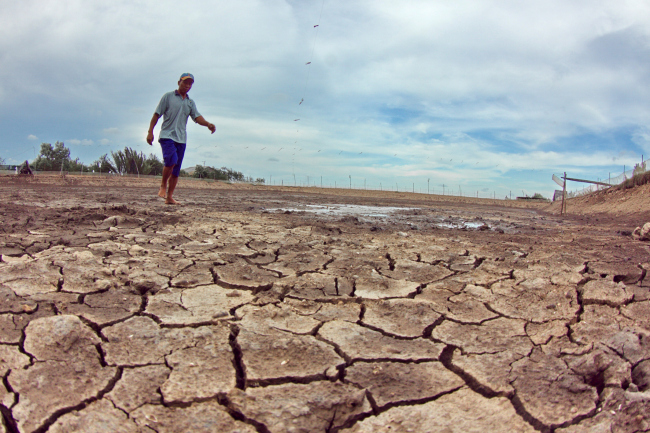PARIS (AFP) ― Early humans living in South Africa made cultural and industrial leaps in periods of wetter weather, said a study that compared the archaeological record of Man’s evolution with that of climate change.
Anatomically modern humans, Homo sapiens, first made their appearance in Africa during the Middle Stone Age which lasted from about 280,000 to 30,000 years ago.
Some of the earliest examples of human culture and technology are found in South Africa ― with fossil evidence of innovative spurts whose cause has left scientists puzzled.
 |
A farmer walks on a dried shrimp pond in the Mekong Delta region of Vietnam, which is one of the most vulnerable locations to the impacts of climate change including severe flooding, droughts, tropical storms and erosion along the sea embankments. (Xinhua-Yonhap News) |
The record reveals that a notable period of human advancement occurred about 71,500 years ago, and another between 64,000 and 59,000 years ago.
Examples of such innovation include the use of symbols, linked to the development of complex language, in engravings, the manufacture and use of stone tools and personal adornment with shell jewellery.
“We show for the first time that the timing of ... these periods of innovation coincided with abrupt climate change,” study co-author Martin Ziegler of the Cardiff University School of Earth and Ocean Sciences told AFP of the study in the journal Nature Communications.
“We found that South Africa experienced wetter conditions during these periods of cultural advance.
“At the same time, large parts of sub-Saharan Africa experienced drier conditions, so that South Africa potentially acted as a refugium for early humans.”
Ziegler and a team reconstructed the South African climate over the past 100,000 years using a sediment core drilled out from the country’s east coast.
The core shows changes in river discharge and rainfall.
“It offers for the first time the possibility to compare the archaeological record with a record of climate change over the same period and thus helps us to understand the origins of modern humans,” Ziegler said by email.
Co-author Chris Stringer of London’s Natural History Museum said the findings supported the view that population growth fuelled cultural advancement through increased human interactions.
“Such climate-driven pulses in southern Africa and more widely were probably fundamental to the origin of key elements of modern human behavior in Africa and to the subsequent dispersal of Homo sapiens from its ancestral homeland,” concluded the study.







![[Weekender] Korea's traditional sauce culture gains global recognition](http://res.heraldm.com/phpwas/restmb_idxmake.php?idx=644&simg=/content/image/2024/11/21/20241121050153_0.jpg)
